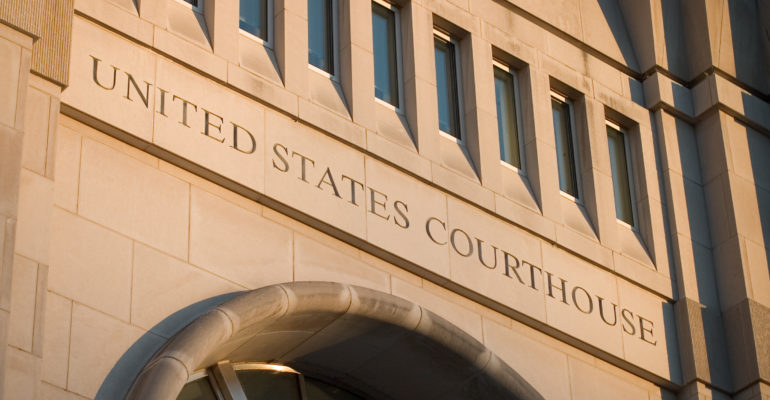 Here are some recent developments in U.S. legal proceedings relating to biosimilars:
Here are some recent developments in U.S. legal proceedings relating to biosimilars:
On December 10, 2018, in the Southern District of Florida, Apotex filed a motion to dismiss the patent infringement complaint that Amgen filed this past August alleging patent infringement based on Apotex’s filing of aBLAs for pegfilgrastim and filgrastim biosimilar candidates. This action is a follow-on suit concerning a manufacturing process patent that issued in January 2018, after the Federal Circuit had already affirmed the district court’s judgment of non-infringement of a related patent in the parties’ first BPCIA litigation. In its supporting brief, Apotex argues that Amgen’s complaint fails to state a claim upon which relief can be granted because (1) Apotex does not literally practice the claimed process, (2) Amgen is estopped from relying on the doctrine of equivalents to prove infringement, and (3) Amgen is estopped from re-litigating allegedly case-dispositive claim construction arguments and rulings from the prior action. Amgen filed it opposition to the motion to dismiss on January 23, 2019, and Apotex’s reply brief is due on February 6, 2019. Also this month, the court entered a scheduling order calling for a trial in May 2020.
Also on December 10, in Momenta’s ongoing appeal to the Federal Circuit of the PTAB’s adverse final written decision upholding the patentability of Bristol-Myers Squibb’s (BMS) abatacept patent, BMS filed a reply to Momenta’s response to the Court’s order to show cause as to why the appeal should not be dismissed as moot in view of Momenta’s public statement that it “has initiated discussions with its collaboration partner, Mylan, to exit its participation in the development of . . . M834, a proposed biosimilar of ORENCIA®.” In its filing, BMS appended copies of Momenta’s recent SEC filings that, in BMS’s view, show that “Momenta [has] satisfied the first prerequisite toward terminating its role in developing the proposed biosimilar that is the foundation of its assertion of Article III standing, further confirming that such standing is lacking.”
Between December 10 and 14, the Federal Circuit received a flurry of appellate briefing in appeals in BPCIA patent litigations and IPRs:
- On December 10, in the Amgen v. Hospira litigation concerning Hospira’s Retacrit® (epoetin alfa-epbx), a biosimilar of Epogen®/Procrit®, Hospira filed its opening appellate brief in its appeal from the adverse judgment it received from the District of Delaware this past September. Hospira challenges, among other things: (1) the district court’s ruling that Hospira infringed one of Amgen’s now-expired manufacturing process patents in 2013-2015 by manufacturing fourteen batches of drug substance outside—as the district court found—the scope of the safe harbor of 35 U.S.C. § 271(e)(1), which allows use of patented processes if reasonably related to the development and submission of information to the FDA; (2) the district court’s finding that Hospira failed to prove that the patent is invalid; and (3) the district court’s award to Amgen of damages and interest of more than $80 million. Amgen’s responsive and cross-appellant brief is due on February 5, 2019.
- Also on December 10, in the Janssen v. Celltrion litigation concerning Celltrion’s and Pfizer’s Inflectra® (infliximab-dyyb), a biosimilar of Remicade®, Janssen filed its opening appellate brief to challenge the Massachusetts district court’s grant of summary judgment of non-infringement in favor of the defendants based on the doctrine of ensnarement. In its brief, Janssen argues that the district court erred in how it analyzed and applied the ensnarement doctrine and the standard for summary judgment. Celltrion’s responsive and cross-appellant brief is due on February 11, 2019.
- On December 12, in the Amgen v. Coherus litigation concerning Coherus’ Udenyca® (pegfilgrastim-cbqv), a biosimilar of Neulasta®, Amgen filed a reply appellate brief in support of its challenge to the Delaware district court’s dismissal of Amgen’s complaint based on the court’s erroneous (according to Amgen) application of prosecution history estoppel and dedication-disclosure doctrine to preclude Amgen’s claim of patent infringement. The parties have completed appellate briefing and are awaiting the scheduling of oral argument.
- Also on December 12, Genentech filed reply briefs in support of its appeals of the PTAB’s adverse final written decisions in Hospira’s IPRs of U.S. Patent Nos. 7,807,799, which concerns a protein purification method using protein A chromatography, and 7,622,115, which concerns a method of treatment using bevacizumab (the active ingredient in Avastin®). In its briefs, in addition to challenging the merits of the PTAB’s decisions, Genentech reiterated its position that the IPR of this patent, which issued before the enactment of the America Invents Act (AIA) and creation of the IPR system in 2011, is unconstitutional as an improper taking under the Fifth Amendment. In November, Hospira (#1, #2) and intervenor the United States (#1, #2) filed briefs in these appeals in which they argued that subjecting pre-AIA patents to IPR comports with the U.S. Constitution.
- On December 14, 2018, Pfizer filed a reply brief in its appeal from the PTAB’s final written decision upholding the patentability of Biogen’s U.S. Patent No. 7,820,161, which concerns a method of treatment using rituximab. Pfizer’s brief focuses on challenging the PTAB’s refusal to consider the Rituxan® label to qualify as prior art during the IPR.
On December 20, 2018, in Genentech’s BPCIA patent litigation in the District of Delaware against Celltrion and Teva concerning their recently approved HERZUMA (trastuzumab-pkrb) biosimilar referencing HERCEPTIN, the parties filed a Joint Stipulation of Dismissal that stated that they “have entered into a settlement agreement, and mutually agree[d] to voluntarily dismiss all claims and counterclaims asserted in the above-captioned consolidated case without prejudice.” On December 27, 2018, the Court endorsed the Stipulation and dismissed the case. Genentech’s related BPCIA litigations against trastuzumab biosimilar developers Amgen and Samsung Bioepis remain pending.
On January 22, 2019, in the Amgen v. Sandoz litigation concerning Sandoz’s Zarxio® (filgrastim-sndz) biosimilar product and its proposed biosimilar of Neulasta®, the Federal Circuit scheduled oral argument for March 4, 2019 at 10:00 am. Amgen is appealing the district court’s grant of summary judgment of non-infringement in Sandoz’s favor with respect to both of the accused biosimilar products, as well as numerous claim construction issues.
On January 23, 2019, in the Amgen v. Mylan litigation concerning Mylan’s Fulphila® (pegfilgrastim-jmdb) biosimilar product, Mylan filed a renewed motion for judgment on the pleadings with respect to the ’707 patent, one of the two patents-in-suit. This motion follows the district court’s November 15, 2018 denial of Mylan’s original motion, without prejudice and “subject to its reassertion (in whole or in part) following the issuance of the Court’s Claim Construction Opinion and Order.” The district court issued its claim construction opinion on November 20, 2018. According to Mylan’s brief supporting its renewed motion, Amgen is not asserting literal infringement of the ’707 patent under the district court’s claim construction ruling, and is prohibited as a matter of law from accusing Mylan of infringement of this patent based on the doctrine of prosecution history estoppel and the dedication-disclosure rule.

